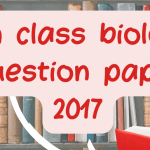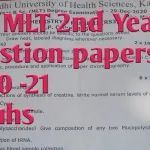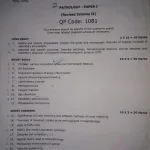Pt BD Sharma University is renowned for offering a variety of academic programs, and preparing for its exams requires a strong understanding of the subject matter. This guide provides comprehensive questions and answers for all subjects, ensuring students have a solid resource for their preparation.
Medical Subjects
Question: What are the four phases of the cell cycle?
Answer: The four phases are G1 (cell growth), S (DNA synthesis), G2 (preparation for mitosis), and M (mitosis).
Question: Define homeostasis.
Answer: Homeostasis is the maintenance of a stable internal environment in the body despite external changes.
Question: What is the function of hemoglobin?
Answer: Hemoglobin transports oxygen from the lungs to the body’s tissues and carries carbon dioxide back to the lungs.
Question: What is an ECG, and what does it measure?
Answer: ECG, or electrocardiogram, measures the electrical activity of the heart.
Question: Describe the structure of a neuron.
Answer: A neuron has three parts: the cell body (soma), dendrites, and an axon.
Question: What is the role of the hypothalamus?
Answer: The hypothalamus regulates body temperature, hunger, thirst, and other homeostatic processes.
Question: Define cardiac output.
Answer: Cardiac output is the amount of blood pumped by the heart in one minute.
Question: What is the primary function of the kidneys?
Answer: The kidneys filter waste products and excess substances from the blood to form urine.
Question: Explain the difference between arteries and veins.
Answer: Arteries carry blood away from the heart, while veins carry blood toward the heart.
Question: What are the types of muscle tissue in the human body?
Answer: The three types are skeletal, smooth, and cardiac muscles.
Question: What is the main function of the liver?
Answer: The liver detoxifies chemicals, metabolizes drugs, and produces bile.
Question: Define osmosis.
Answer: Osmosis is the movement of water molecules through a semipermeable membrane from a region of low solute concentration to high solute concentration.
Question: What is the function of platelets in blood?
Answer: Platelets help in blood clotting and prevent excessive bleeding.
Question: What are antigens and antibodies?
Answer: Antigens are foreign substances that trigger an immune response, while antibodies are proteins that attack these antigens.
Question: Describe the role of the pancreas.
Answer: The pancreas produces insulin and glucagon to regulate blood sugar levels and digestive enzymes.
Question: What is the function of the small intestine?
Answer: The small intestine absorbs nutrients and minerals from food.
Question: What are the components of the central nervous system?
Answer: The brain and spinal cord make up the central nervous system.
Question: Define hypertension.
Answer: Hypertension is high blood pressure, a condition where the force of blood against artery walls is too high.
Question: What are the functions of white blood cells?
Answer: White blood cells protect the body against infections and foreign invaders.
Dental Subjects
Question: What is dental caries?
Answer: Dental caries is the decay of teeth caused by bacterial infection.
Question: Define periodontal disease.
Answer: Periodontal disease is an infection of the structures around the teeth, including gums and bones.
Question: What is the role of fluoride in dental care?
Answer: Fluoride strengthens tooth enamel and prevents cavities.
Question: Explain the process of tooth eruption.
Answer: Tooth eruption is the movement of teeth as they emerge through the gums into the oral cavity.
Question: What is the difference between plaque and tartar?
Answer: Plaque is a sticky film of bacteria, while tartar is hardened plaque that forms on teeth.
Question: Describe the anatomy of a tooth.
Answer: A tooth has three layers: enamel, dentin, and pulp.
Question: What is the purpose of root canal treatment?
Answer: Root canal treatment removes infected pulp and seals the tooth to prevent further infection.
Question: What are dental implants?
Answer: Dental implants are artificial tooth roots placed in the jaw to support replacement teeth.
Question: Define malocclusion.
Answer: Malocclusion refers to the misalignment of teeth and jaws.
Question: What is orthodontics?
Answer: Orthodontics is a branch of dentistry that corrects misaligned teeth and jaws.
Question: What is a dental crown?
Answer: A dental crown is a cap placed over a damaged or decayed tooth to restore its shape and function.
Question: What is gingivitis?
Answer: Gingivitis is the inflammation of the gums, often caused by poor oral hygiene.
Question: What is bruxism?
Answer: Bruxism is the grinding or clenching of teeth, often during sleep.
Question: What is the function of saliva?
Answer: Saliva helps in digestion, keeps the mouth moist, and protects teeth from decay.
Question: What are the types of dental fillings?
Answer: The types include amalgam, composite resin, gold, and ceramic fillings.
Question: Define halitosis.
Answer: Halitosis refers to chronic bad breath, often caused by poor oral hygiene or underlying conditions.
Question: What is the role of a dental hygienist?
Answer: A dental hygienist cleans teeth, examines oral health, and educates patients on maintaining oral hygiene.
Question: What is a dental bridge?
Answer: A dental bridge replaces one or more missing teeth by anchoring artificial teeth to adjacent natural teeth.
Question: What is tooth sensitivity?
Answer: Tooth sensitivity is discomfort or pain in teeth when exposed to hot, cold, sweet, or acidic substances.
Pharmacy Subjects
Question: What is pharmacology?
Answer: Pharmacology is the study of drugs, their actions, and their effects on the body.
Question: Define bioavailability.
Answer: Bioavailability is the proportion of a drug that enters circulation and has an active effect.
Question: What are the types of drug administration routes?
Answer: The types include oral, intravenous, intramuscular, subcutaneous, and topical.
Question: What is a half-life of a drug?
Answer: The half-life is the time it takes for half the drug’s concentration to reduce in the body.
Question: What are controlled-release medications?
Answer: These medications release active ingredients slowly over time for sustained effects.
Question: Define a generic drug.
Answer: A generic drug is a medication that has the same active ingredients as a branded drug but is sold under its chemical name.
Question: What is pharmacokinetics?
Answer: Pharmacokinetics is the study of how drugs are absorbed, distributed, metabolized, and excreted.
Question: What is the therapeutic index?
Answer: The therapeutic index is the ratio between a drug’s effective dose and its toxic dose.
Question: What is an adverse drug reaction?
Answer: An adverse drug reaction is an unintended and harmful response to a medication.
Question: What is drug resistance?
Answer: Drug resistance occurs when microorganisms no longer respond to a drug designed to kill them.
Question: Define antibiotics.
Answer: Antibiotics are drugs that kill or inhibit the growth of bacteria.
Question: What is pharmacodynamics?
Answer: Pharmacodynamics studies the effects of drugs and their mechanisms of action.
Question: What are antipyretics?
Answer: Antipyretics are drugs used to reduce fever.
Question: What is a placebo?
Answer: A placebo is an inactive substance given to a patient to test the effectiveness of a drug.
Question: What are over-the-counter medications?
Answer: Over-the-counter medications are drugs available without a prescription.
Question: Define immunosuppressants.
Answer: Immunosuppressants are drugs that suppress the immune system to prevent organ rejection or treat autoimmune diseases.
Question: What is a contraindication?
Answer: A contraindication is a specific situation where a drug should not be used.
Question: What are diuretics?
Answer: Diuretics are medications that increase urine production to remove excess fluid from the body.
Question: What is a clinical trial?
Answer: A clinical trial is a research study conducted to evaluate the safety and effectiveness of a drug.
Pt BD Sharma University provides extensive resources for diverse subjects, helping students excel in their exams. This guide ensures thorough preparation by covering key questions and answers, aiding understanding and retention.
Latest Posts
- Step-by-step guide to download and apply for jee mains admit card 202
- Comprehensive 2025 government holidays and recruitment details for job seekers
- JEE Mains Admit Card 2025: Your Step-by-Step Guide to Downloading the Hall Ticket
- Everything You Need to Know About 2025 Government Holidays Recruitment
- Comprehensive Guide to rrb d group recruitment 2025 – Eligibility, Vacancies, and Application
- Detailed guide to nps trust recruitment 2025 vacancies, eligibility and apply process
- Comprehensive guide to hpcl recruitment 2025 notification, vacancies, and application process
- ignou bed admission 2025 complete recruitment guide with eligibility and process
- Comprehensive Guide to Indian Army Agniveer Recruitment 2025 Notification and Jobs
- Everything You Must Know About CBSE Board Exams 2025 Changes & New Rules






